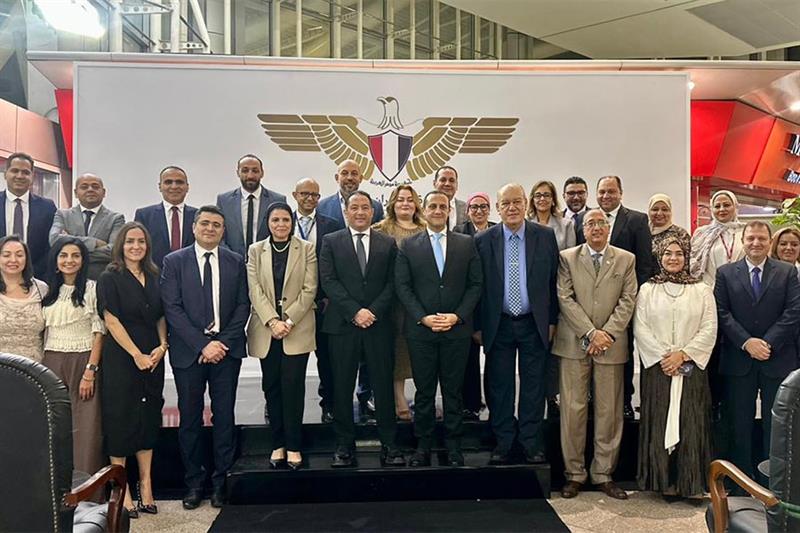Cairo International Airport has launched Maryam, an artificial intelligence-powered virtual assistant designed to guide passengers in Arabic and English, marking a milestone in Egypt’s national digital transformation strategy.
The innovation, developed by the Egyptian Holding Company for Airports and Air Navigation (EHCAAN) in partnership with Orange Egypt, aims to transform how travelers interact with airport services through smart, interactive devices installed across terminals.
“The launch of ‘Ask Maryam’ at Cairo International Airport is a milestone in our journey toward full digital transformation,” said Eng. Aiman Arab, Chairman of EHCAAN.
He added that the initiative “reflects our commitment to adopting cutting-edge smart solutions that enhance the passenger experience and strengthen the global competitiveness of Egyptian airports.”
What Is Maryam AI?
Maryam is an interactive virtual assistant powered by artificial intelligence, built to serve as a digital companion for passengers moving through the airport. Using natural language processing, it allows users to ask questions and receive immediate responses in both Arabic and English.
Positioned at multiple Smart Interactive Devices (SIDs) around Cairo International Airport, Maryam is designed to provide personalized assistance without the need for human intermediaries.
This means travelers, whether they are frequent fliers, first-time visitors, or international tourists, can access a wide range of information and services in real time.
The system symbolizes a major shift in Egypt’s approach to public-facing AI, embedding smart technology directly into everyday experiences.
By integrating Maryam into airport operations, Egypt is setting a regional precedent for blending artificial intelligence with physical infrastructure to make public spaces more responsive and user-friendly.
What Maryam Can Do
Maryam’s role goes far beyond basic information delivery. Through its smart touchscreens and voice-enabled interfaces, passengers can check flight schedules, boarding gates, and baggage claim areas.
The assistant also provides step-by-step directions for navigating terminals, locating restrooms, prayer rooms, restaurants, and lounges.
For arriving passengers, Maryam offers guidance on immigration and customs procedures, helping to reduce confusion and streamline movement through the airport.
But Maryam’s utility extends outside the terminal walls. The system connects travelers to transportation options, including details about taxis, limousines, and shuttle services, as well as nearby hotels and tourist attractions.
This makes it not just an airport assistant, but a digital concierge linking Egypt’s aviation infrastructure with its broader tourism ecosystem.
According to EHCAAN, the technology ensures that passengers “receive instant answers to any inquiries related to flight information and schedules, travel and arrival procedures, and the locations of facilities and services inside the airport.”
The Engineers Behind Maryam
The project is the result of a strategic collaboration between EHCAAN and Orange Egypt, blending aviation expertise with advanced telecommunications technology.
EHCAAN, the government body responsible for managing Egypt’s airports, led the initiative to align with the country’s overarching digital transformation agenda, which seeks to make public services more efficient through smart technologies.
Orange Egypt provided the technical backbone, integrating artificial intelligence with real-time data processing, voice recognition, and multilingual capabilities. This partnership represents a practical example of how public-private collaboration can drive innovation in infrastructure.
Orange Egypt’s technical engineers and AI specialists were instrumental in building Maryam’s responsive interface and connecting it to airport databases to deliver real-time updates on flight operations and logistics.
Together, both institutions envision Maryam as a scalable model that can be customized and deployed across multiple airports in Egypt and, eventually, beyond.
Egypt’s Expansion Plans
EHCAAN has already announced plans to extend Maryam’s deployment to other airports across the country, starting with Sphinx International Airport, located near the Giza Plateau.
The rollout will coincide with the highly anticipated opening of the Grand Egyptian Museum, ensuring that the expected influx of international visitors can benefit from the same smart, tech-driven assistance.
“We are already working on rolling out this service across other Egyptian airports, starting with Sphinx International Airport in time for the opening of the Grand Egyptian Museum,” confirmed Eng. Aiman Arab.
The broader vision is to create a network of AI-assisted airports under Egypt’s national digital transformation framework, enabling smoother operations, shorter wait times, and better traveler engagement.
EHCAAN’s roadmap also includes plans for integrating predictive analytics, automated feedback systems, and potentially AI-powered language translation for non-Arabic and non-English speakers, making Egypt’s airports more inclusive and globally competitive.
Building Smart Airports Through Technology
The introduction of Maryam is a cornerstone of Egypt’s ambition to transition toward smart airport ecosystems, spaces where AI, automation, and real-time data converge to improve safety, efficiency, and customer satisfaction.
The initiative forms part of EHCAAN’s broader integrated digital strategy, which aligns with Egypt’s national goals of leveraging technology to modernize infrastructure and strengthen the tourism and transport sectors.
Technically, Maryam operates on a combination of AI-driven dialogue systems and cloud-based databases that process passenger queries in milliseconds. It represents a move toward “contactless” and “self-service” airport experiences, an area that gained global traction after the COVID-19 pandemic.
By adopting AI at the core of passenger interaction, Egypt not only enhances user convenience but also gathers valuable insights into traveler behavior, helping airport authorities plan more effectively.
Talking Points
Egypt’s introduction of Maryam is not just a technological upgrade, it’s a cultural and strategic statement about how nations can blend innovation with identity.
Naming the AI assistant “Maryam” carries symbolic weight, it is one of the most common and respected female names across the Arab world, associated with compassion, approachability, and trust, traits that reflect the assistant’s role as a friendly, helpful digital companion rather than a cold machine.
This choice humanizes technology, making it more relatable to passengers who may otherwise feel uneasy interacting with artificial intelligence.
On a broader scale, Maryam embodies Egypt’s ambition to reposition itself as a leader in digital modernization within Africa and the Middle East, using AI to enhance public services while maintaining a distinctly human and cultural touch.
It also shows a subtle but significant shift in how Egypt is reimagining service delivery, blending heritage, hospitality, and high technology to present a modern face to millions of travelers passing through Cairo each year.
In this sense, “Maryam” is not just a name; it’s a metaphor for the balance Egypt seeks between progress and tradition, innovation and warmth, a fitting reflection of a nation transforming its infrastructure while holding firmly to its cultural soul.
_________________________
Bookmark Techparley.com for the most insightful technology news from the African continent.
Follow us on X/Twitter @Techparleynews, on Facebook at Techparley Africa, on LinkedIn at Techparley Africa, or on Instagram at Techparleynews






